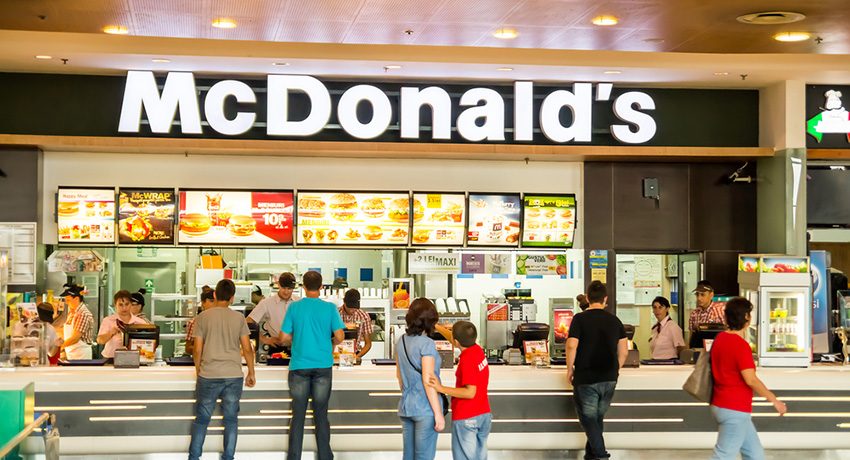Boston’s Restaurant Meals Exceed Daily Calorie Needs

McDonald’s is posting calorie information now. All large chains will be required to this year. Photo via Radu Bercan / Shutterstock.com
Last month, we asked why Boston restaurant menus don’t have the calories listed like they do in New York City. We are the third healthiest city in America, after all. Buried deep in the legislation of the Affordable Care Act, aka Obamacare, is a mandate saying that starting this year, restaurant chains with 20 or more locations will be required to list calories on their menus. This is good news for many of us who are trying to eat healthier.
Researchers at the Jean Mayer USDA Human Nutrition Research Center on Aging (HNRCA) at Tufts University wanted to know how Boston restaurants measure up before they are required to list calories, and the findings are pretty striking. On average, the meals contained 1,327 calories (each!), which is two to three times the estimated calorie needs of an adult at a single meal, and 66 percent of the typical daily calorie requirements. That is just for one meal. Nearly three-quarters (73 percent) of the meals analyzed contained more than half of the FDA’s daily energy recommendation of 2,000 calories, and 12 of the 157 meals studied contained more than the entire recommended daily energy intake. The findings were published today in JAMA Internal Medicine.
Researchers analyzed 157 full meals, including side dishes, from 33 randomly selected independent or small-chain restaurants within 15 miles of downtown Boston. All of the restaurants tested had an online menu but did not provide nutritional information. Researchers collected samples from the most popular food choices in the nine most common restaurant types, which are Mexican, American, Chinese, Italian, Japanese, Thai, Indian, Greek, and Vietnamese. The study was conducted during the summer of 2011. Specific meal items selected for the study were picked based on customer rankings and Internet searches of the restaurant’s most popular food items.
“On average, the meals studied contained 1,327 calories, which significantly exceeds the estimated energy needs of an individual adult at a single meal,” says senior and corresponding author Susan B. Roberts, Ph.D., director of the Energy Metabolism Laboratory at the HNRCA. “Meals from all restaurant types provided substantially more energy than is needed for weight maintenance.”
Among the meal categories studied, the Italian (1,755 calories), American (1,494 calories) and Chinese (1,474 calories) meals had the highest average calorie levels. Vietnamese meals had the lowest calorie levels as measured by gross energy, with an average of 922 calories. The Japanese meals had the second lowest calories, with an average of 1,027 calories, which is sort of good news for sushi lovers, but still pretty high for one meal.
The study also looked into the difference in calories between large chain restaurants and small chain restaurants, but those findings were not statistically significant. “These comparative findings suggest that both non-chain and chain restaurants contribute to the obesity epidemic, which is making people unhealthy and has a huge impact on health care costs,” says Dr. Roberts, who is also a professor of nutrition science and policy at Tufts University and an adjunct professor of psychiatry at the Tufts University School of Medicine.
The study’s first author, Dr. Lorien Urban, a postdoc scholar in the Energy Metabolism Laboratory at the HNRCA, says that national recommendations for the prevention and treatment of obesity stress individual self-monitoring of food consumption, but there is little available information on the energy content of foods offered by restaurants that are not required to post nutrition information. “Given that an imbalance between energy intake and energy expenditure of only 100 calories per day can lead to a weight gain of between six and fifteen pounds per year, our findings suggest that routine reporting of meal calorie content by all restaurants, not just large chains, would encourage individuals to make informed choices about their diet and would discourage restaurants from offering unhealthy portions,” Urban says.


